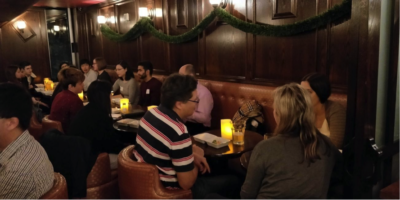Event Recap – Mini-Networking Night: Careers in the Public & Non-Profit Sector
On October 23rd, LSCDS hosted the first Mini-Networking event of the 2019/20 academic year. The night focused on careers in the public and non-profit sectors and featured guests from Ontario Genomics, University Health Network, Cancer Care Ontario, Ontario Institute for Cancer Research, Canadian Cancer Society, and the Ministry of Health. Here, I share some of the insights and advice our guests had for graduate students.
Who are Public and Non-Profit Professionals?
Public and non-profit professionals can find themselves in a wide variety of roles and organizations. In the case of life science graduates and scientists, many find careers in health ministries, government-funded research institutes, or patient- and research-focused charitable foundations. Non-profit agencies are best understood as mission-driven organizations where profits are re-invested to further their goals. Life science graduates can leverage their formal scientific training for roles in science communication, managing grant funding, data analytics, project management and more diverse positions.
My Networking Experience
This was my first time attending a Mini-Networking event held by the LSCDS. Students and guests arrived at the Prenup Pub and headed to a private networking area. We sat at tables of 3-5 students per guest, creating a more casual networking environment. If the idea of approaching professionals in a room among dozens of other students is daunting, you will find these events much more comfortable and engaging.
At my table, I had the opportunity to meet fellow job-seeking students like Lang Liu, a recent BSc graduate in Cell Biology and Statistics, and Clare Sheen, a current MHSc student in Medical Genomics. Together we asked guests about their career path and work life and received personalized advice for our career aspirations.
Advice for Students
While networking is an important tool to meet professionals and discover job opportunities, it’s also a great way to learn new tips and tricks to finding your first job out of graduate school. Below are some tidbits of information I gathered from speaking with our guests.
Dr. Robert Chen, a Research Impact Specialist at University Health Network (UHN), recommended reaching out to your current network for job opportunities. Networking with new people is important, but Dr. Chen stressed only those who know you best can vouch for you within their organization, which gives you a leg up over other applicants.
If you’re interested in a career in science communication, Dr. Betty Zhou had sound advice: start writing! During her time in graduate school, Dr. Zhou began blogging about science outside of her research field. When it came time to apply for jobs, she already had a portfolio of written pieces to compliment her PhD. Today, Dr. Zhou is the Manager of Research Communications for the Canadian Cancer Society.
And finally, Dr. Carlos Zepeda-Velázquez had four tips that apply to all life science graduates:
1. Expand your network
As a trained chemist, Dr. Zepeda-Velázquez ran into an issue after his PhD: he only knew other chemists! This is why he recommends diversifying your network to include professionals from a variety of backgrounds.
2. Find a mentor in your field of choice
When Dr. Zepeda-Velázquez looked to transition into chemical biology, he was at a disadvantage because of his primary focus on drug development and organic chemistry. However, he found a mentor who helped fill the gaps he needed to interview and work with biologists.
3. Work smart, not hard
Being able to focus and put in the work is a great personal quality. But sometimes you need to be more strategic in how you utilize your time and energy. If sending out 100 job applications didn’t land you an interview, Dr. Zepeda-Velázquez says changing your strategy is a key to finding success.
4. Reach out
Dr. Zepeda-Velázquez recommends reaching out to laboratories or companies that you find interesting. However, always be authentic. To be taken as a serious candidate, you should research the company and the specific field and read any available publications.
Next Up
The LSCDS is hosting the next Mini-Networking series on November 20th. The theme will be Business Development in Healthcare & Pharma.
